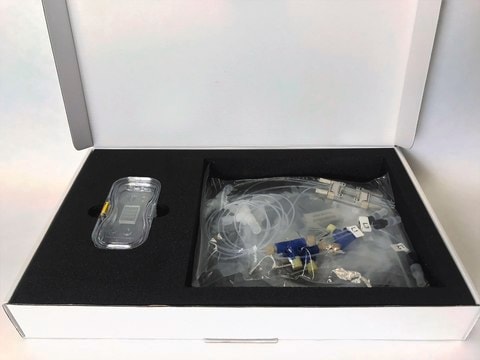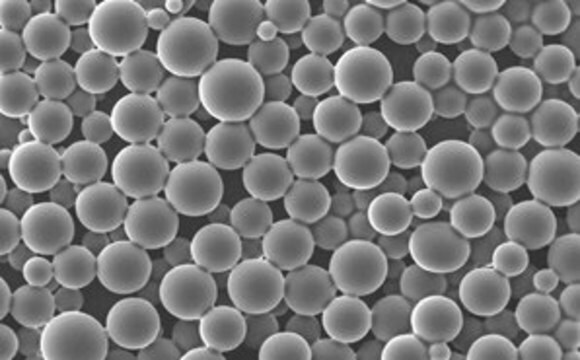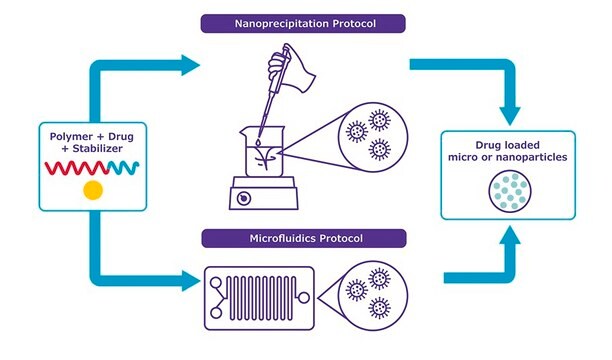推薦產品
描述
PLGA nanoparticle screening kit for synthesis of 100 and 200 nm particles
品質等級
應用
advanced drug delivery
儲存溫度
2-8°C
一般說明
NanoFabTx™ PLGA-nano reagent kit is a nanoformulation kit designed for the synthesis of specifically sized, drug-encapsulating poly(lactic-co-glycolic acid) (PLGA) nanoparticles. The NanoFabTx™ PLGA-nano reagent kit provides reagents (PLGA and stabilizer) and protocols to synthesize polymeric nanoparticles 75 to 200 nm in size. One protocol describes how to use the kit with standard glassware using a nanoprecipitation or solvent-displacement method. The second protocol describes how to use the kit with the NanoFabTx™ Microfluidic - nano device kit (Cat.No. 911593) for the fabrication of nanoparticles using microfluidic methods.
應用
With NanoFabTx™ PLGA-nano reagent kit, users can simplify their methods for PLGA nanoparticle synthesis and their drug loading experiments. Our protocols describe how to tune the synthetic parameters to achieve monodisperse nanoparticles 75 nm in size, 200 nm in size, or any size in between. As a result, the kit enables users to synthesize and test different particle sizes and identify the ideal size and drug loading of PLGA nanocarriers for their research application. The resulting particles are biocompatible and biodegradable and can be further modified to target specific tissues or to ensure slow and sustained drug release. PLGA is a biocompatible and biodegradable polymer that is approved by the FDA for biomedical and pharmaceutical applications and that is used widely in drug delivery systems for sustained release of many different types of therapeutic molecules. PLGA-based nanocarriers can be used to encapsulate both hydrophobic drugs like curcumin and lipophilic drugs like docetaxel. PLGA nanocarriers synthesized with the NanoFabTx™ kits are suitable for biomedical research applications such as oncology, immuno-oncology, gene delivery, and vaccine delivery. Polymeric nanoparticles are useful for intravenous or systemic delivery of drug molecules. For example, polymeric nanocarriers improve drug dissolution and solubility of hydrophobic and lipophilic drugs. In addition, the small size of polymeric nanocarriers make them much more likely than larger microparticles to bypass the reticuloendothelial system and complement system, usually leading to longer circulation half-lives. In addition, nanoparticles can pass through the blood-brain barrier, through tumor vasculature, and can enter cells via pinocytosis.
特點和優勢
- Step-by-step protocols developed and tested by our formulation scientists
- Flexible synthesis tool to create uniform and reproducible nanoparticles
- Choose from standard glassware-based nanoprecipitation or microfluidic-based protocols
- Optimized to make nanoparticles 75-200 nm nanoprecipitation or microfluidics with low polydispersity
- Based on non-toxic, biodegradable polymers
法律資訊
NANOFABTX is a trademark of Sigma-Aldrich Co. LLC
相關產品
產品號碼
描述
訂價
儲存類別代碼
11 - Combustible Solids
閃點(°F)
Not applicable
閃點(°C)
Not applicable
Gaurav Kumar et al.
Critical reviews in therapeutic drug carrier systems, 29(2), 149-182 (2012-04-06)
Drug-loaded polylactide-co-glycolide (PLGA) nanoparticles have been extensively studied and have a practical impact on drug delivery. Many PLGA-based nanoformulations have reached different stages of preclinical development; however, they present distinct challenges for researchers. This review discusses some of the challenges
L Martin-Banderas et al.
Mini reviews in medicinal chemistry, 13(1), 58-69 (2012-09-15)
This article presents the potential of PLGA nanoparticles for the oral administration of drugs. Different strategies are used to improve oral absorption of these nanoparticles. These strategies are based on modification of nanoparticle surface properties. They can be achieved either
文章
Professor Robert K. Prud’homme introduces flash nanoprecipitation (FNP) for nanoparticle fabrication, which is a scalable, rapid mixing process for nanoparticle formulations.
我們的科學家團隊在所有研究領域都有豐富的經驗,包括生命科學、材料科學、化學合成、色譜、分析等.
聯絡技術服務



